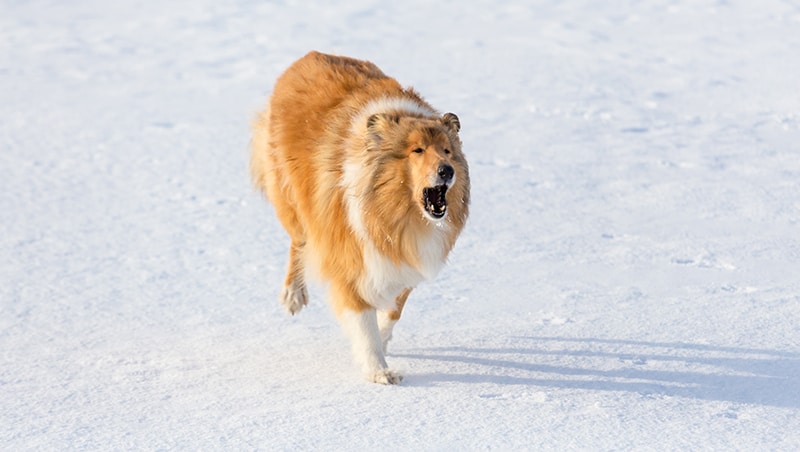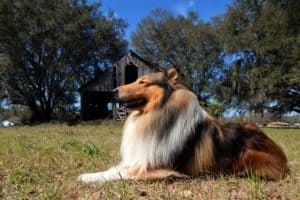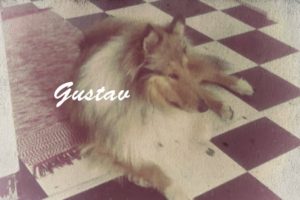Living with a Rough Collie (long-haired Collie) or Smooth Collie (short-haired Collie) can be a wonderful experience, but it’s not without its challenges.
One issue Rough Collie owners may face is excessive barking. While barking is a natural behavior for dogs, excessive barking can be frustrating for both the owner and their neighbors.
You may be asking, “do Rough Collies bark a lot?” The answer is no, at least not compared to some other breeds. But because Rough Collies are so interested in communicating with people, they can be extremely vocal at times. However, with the right dog training techniques, barking can be effectively reduced.
So if you are a Collie owner struggling with barking, don’t fret!
In this article, we’ll discuss some of the most effective techniques for minimizing barking in Rough Collies. From understanding the root causes of their barking to implementing positive reinforcement training, we’ll explore what you need to know to keep your Rough Collie happy, healthy and hopefully – somewhat quiet.
So, whether you’re a new Rough Collie owner or you’ve been living with your furry friend for years, read on for valuable insights and tips.
Table of Contents
Understanding the reasons behind Rough Collie barking
Before you can effectively manage your Collie’s barking, it’s important to understand why they are barking in the first place.
Rough Collies are a highly intelligent breed known for their strong desire to communicate with their owners.
Barking is one of the ways they communicate, and it can indicate a range of emotions and needs. Here are some reasons Rough Collies may bark:
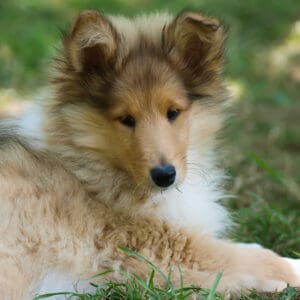
Bored or Attention-seeking
Sometimes Rough Collies bark to get attention. Maybe they want playtime, food or water, or just some affection from their owners.
If your Rough Collie is barking for attention, evaluate whether they are getting enough exercise and playtime throughout the day.
A bored dog is often a barky dog, while a tired dog is a calm dog! Most Collies need only moderate exercise, but younger Collies and high-drive Collies will naturally need more outlets for their energy.
Anxious or nervous
Though it is not the norm in Rough Collie temperaments, some may exhibit anxiety and nervousness.
This can manifest as increased barking. Collies may bark when they are left alone, when they hear loud noises like thunder or fireworks, or when they encounter unfamiliar animals or suspicious strangers.
If your Rough Collie is barking due to true anxiety, it’s important to address the root cause. This may involve working with a professional dog trainer or behaviorist to help your Collie overcome their struggles.
Watchdog tendencies
Rough Collies are known for their protective natures, but they want to scare away intruders, not fight them.
There is a saying: “Collies will protect people, not property.” They may sound the alarm when someone approaches their property (that danged mailman for instance) or if a strange animal dares to invade the home front.
If your Rough Collie is barking overmuch, it’s important to establish clear boundaries and rules for their vocalizing. Once your Collie has loudly notified you of a potentially life-threatening situation, reassure them that the castle is not, in fact, under attack.
Use these outbursts as an opportunity to practice quiet behavior, and reward them accordingly.

Tips for managing Rough Collie barking
Now that we’ve examined some of the reasons Rough Collies bark, let’s explore tips for managing the barking.
Positive reinforcement
For many people, positive reinforcement training is the go-to way to manage their Collie’s barking.
It involves rewarding your dog for desired behavior and ignoring or redirecting them when they exhibit undesirable behavior.
For example, if your Rough Collie is barking for attention, you can try literally turning your back and ignoring them until the barking has stops, then rewarding them with a treat or praise.
Using positive reinforcement can train your Rough Collie to be calm and relaxed in various situations like encountering new people or animals.
Training practical commands
Training can involve teaching them basic obedience commands, such as “sit” and “stay,” as well as more advanced commands, such as “quiet” or “speak.”
Teaching your Rough Collie these commands can help them understand what is expected of them and how they should behave in different situations. Once learned, “quiet” is like a magical off switch!
If needed, consult a professional dog trainer to develop a customized training plan tailored to your Collie’s specific needs and behaviors.
Exercise
Rough Collies are generally a moderate energy breed that can even adapt to apartment living, but a Rough Collie without a yard will require daily walks.
Collies need physical activity to stay healthy and happy, and a high-drive Rough Collie will thrive when given a job.
Lack of exercise can lead to boredom and frustration, then manifest in over-the-top barking.
You can also make sure your Rough Collie gets enough exercise throughout the day through runs in the park. Some Collies also enjoy fetch.
Incorporating interactive playtime and games into their daily routine will help them stay mentally stimulated and engaged.
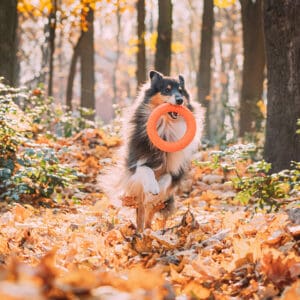
Tools and equipment for managing Rough Collie barking
Collars
Special collars can be implemented to manage barking. There are several types of collars available, including anti-bark collars, electric collars, and citronella collars.
Anti-bark collars emit a high-pitched sound or vibration when your Rough Collie barks, while electric collars can beep and vibrate, while some will deliver a mild static shock.
Citronella collars release a burst of citronella spray when barking is detected. Many Collie owners prefer – and have a high success rate – operating these tools manually via remote instead of purchasing automatic collars. In most cases, tone (beep) and vibrate settings will be enough to get a Collie’s attention.
It’s important to choose a collar that is appropriate for your Rough Collie’s specific needs and behaviors.
Electric Collar

Citronella Collar

Ultrasonic dog bark deterrent
Another alternative to collars is an ultrasonic noise emitter, or an anti-bark device.
It produces a high-pitched sound at a frequency undetectable to human ears, but the dogs themselves can clearly hear it! For many people, this can be a godsend.
Some of these devices also include a flashlight, a regular “beep” button, and adjustable frequencies. They are usually handheld, portable, and convenient as they don’t require a collar to work.
While perfectly harmless, many Collies don’t like the sound. It can be an excellent way to get their attention, then appropriately redirect them.
Ultrasonic Deterrent

Anti-pull harnesses and collars
Front-clip harnesses, no-pull harnesses, martingale collars, or head collars (Gentle Leaders in particular) are also effective tools for Collies who vocalize on walks.
They help control their movements and prevent them from pulling or dragging you while on a leash. Some Rough Collie owners choose minimal head collars (basically two narrow loops) while walking to protect the long hair of their mane.
No-Pull Harness

Training aids
There are also various training aids to help manage Collie vocalizations.
These can include clickers, treat bags, and training mats. Clickers reinforce positive behaviors (promising good things are coming!), while treat bags, favorite toys, or butt scratches reward desired behaviors.
Training mats used to establish a”place” command can also help your Rough Collie understand where they should be and how they should behave in different situations.
Training Clickers

Treat Pouch


Common mistakes to avoid when managing Rough Collie barking
While there are many ways to manage Rough Collie barking, there are also plenty of mistakes owners should avoid, such as:
Punishing your Rough Collie
Punishing your Collie for barking is not an effective way to manage this behavior. This can lead to fear and anxiety, which can actually exacerbate their barking.
Instead of punishing your Collie for being vocal, try using positive reinforcement and training techniques to encourage good behavior.
Remember, what we call noise is just them trying to communicate.
Ignoring your Rough Collie's needs
If your Rough Collie is barking excessively, it’s important to make sure their needs are being met.
As discussed, this may involve providing more exercise or playtime, but underlying health or behavioral issues should also be considered and addressed when necessary.
Ignoring your Collie’s needs can lead to increased barking and other undesirable behaviors.
Using inappropriate tools or techniques
Using inappropriate tools or techniques can be harmful to your Rough Collie’s health and well-being.
Generally, Collie are sensitive creatures who won’t respond well to heavy-handed management.
Overcorrection can make them shut down. It’s important to choose training aids and methods tailored to your Rough Collie’s specific needs and behaviors.
For example, “shock collars” can be harmful. Some e-collars only have the option for beep and vibrate, and on many others the static shock setting can be disabled.
Also, shock settings are not very compatible with Rough Collie fur. It is recommended to steer clear of shock collars and try other options.
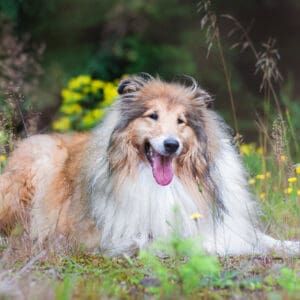
Conclusion
Do Rough Collies bark a lot? They may, but by understanding the reasons behind their barking and implementing the right tools and techniques, you can reduce their barking and create homeostasis in your home environment.
Remember to use positive reinforcement and avoid punishing your Rough Collie, and always choose tools and techniques appropriate for their specific needs and behaviors.
With the right approach combined with patience and dedication, you can successfully manage Rough Collie or Smooth Collie barking and enjoy a happy, healthy life together.
*This article was written with the help of Chatsonic.

